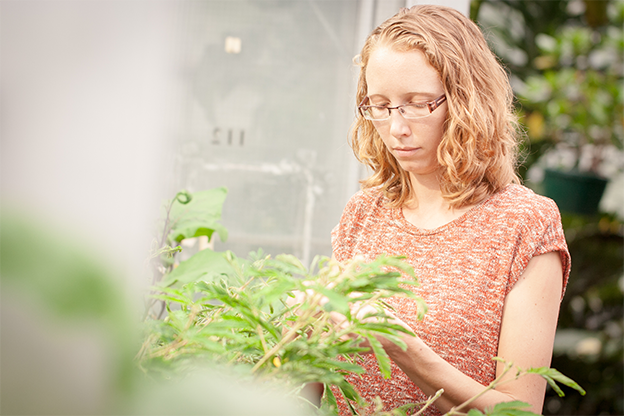Nothing to sneeze at: ragweed behaves better with kin

McMaster graduate student Amanda File conducting fieldwork.
Cheating. Conflict. Competition. It may sound like a soap opera but this is the complex life of the despised ragweed plant.
And in the highly competitive fight for nutrients, researchers have found ragweed will behave altruistically with its siblings, investing precious resources for the benefit of the group.
A growing body of work suggests plants recognize and respond to the presence and identity of their neighbours and the findings, published online in the journal PLOS ONE, provide further evidence of the importance of family in preserving cooperation within and between species.
Specifically, researchers examined the mutually beneficial relationship between common ragweed, or Ambrosia artemisiifolia L., and mycorrhizal fungi.
In this relationship, the plant provides carbohydrates to the fungi which allow it to grow and colonize the soil. In return, the plant receives water, much-needed nutrients and protection from dangerous pathogens.
“The stability of this relationship can be compromised by cheaters,” says Amanda File, a graduate student in the Department of Biology at McMaster University and lead author of the study.
“That happens because a single fungal network may interact with many plants, which creates opportunities for individuals to reap the rewards and the nutrients, without actually donating carbohydrates,” she says.
In this study, researchers conducted two separate experiments to determine how social environment affects the plants’ investment in the network. That is, whether the presence of family or strangers affects their behaviour.
When the ragweed was planted with its kin, the fungal network was larger—implying greater costs to the plants—but also creating greater benefits for them.
Moreover, increased fungal colonization of the roots was associated with a reduced number of root lesions caused by pathogens.
“If plant kin recognition is a real thing, we predict that social environment will affect many kinds of plant interactions,” says Susan Dudley, an associate professor in the Department of Biology. “We have seen kin recognition for traits involved in plant competition and here we see that cooperation between species is certainly enhanced by altruism towards relatives.”
The findings could have future implications for farming, she adds.
“Mycorrhizal fungi are now available commercially as soil additives for garden plants. And while conventional agricultural practices generally disrupt mycorrhizal fungi, there is potential for it to play an important role in sustainable farming by promoting growth naturally.”
